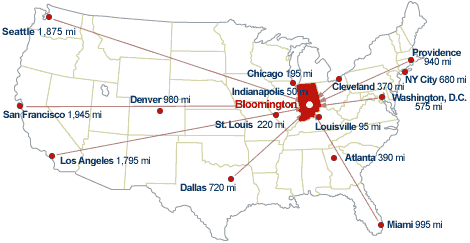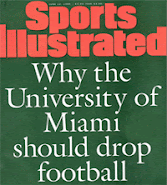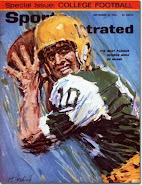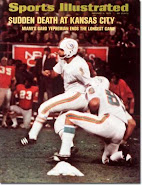As with most George Will-penned columns, South Beach Hoosier's always felt there were
interesting original thoughts and nuggets of insight in his columns, even if you disagree with certain of his points, and these two recent columns are no exception.
What surprises me -though perhaps surprised isn't the word, since it's the Internet after all- are the high number of people responding with Pavlovian predictability in the Washington Post's comments forum-links below.
The responses there are very different from the comments that one sees at other media sites where these same Will articles are run, like TownHall.com, with facts being the favored approach to the latter.
That's not by accident.
Keep in mind, too, as you read them, that most of the writers on the forum clearly live outside of the immediate Washington area.
The Post readers' uniformly gratuitous/negative comments to these articles, based not on any particular clever use of quantifiable facts by the writer, or even some effective retort to Will's central argument or points, based on some great miscalculation or mis-statement on his part, but rather a more base general ignorance of American and World history.
A willingness to disregard a reality that's staring them in the face and that keeps them and their point-of-view firmly in the minority, and, therefore, firmly on the losing side of history.
But some people -and we all know folks like this- for reasons of their own, prefer to play the role of martyr.
To cast themself and their allies as the underdog, even if it's neither appropriate or an accurate depiction of the circumstances, because the underdog doesn't have to play by society's rules.
It's their conscious way of getting attention that they'd never gain by actually having an original and compelling argument -based in reason and human behavior- that would actually carry the day.
To me, compared to posts on these columns I've read elsewhere, the comments to the Post evince an almost juvenile point-of-view that says that because Will argues one thing, and Will is conservative, therefore Will must be wrong and Fidel Castro and his supporters must really just be misunderstood.
And that, in any case, it's all just a big media-supported manipulation of facts, and only THEY really know what's going on. (There's always that twist thrown in at the end!)
That sounds like a poorly-conceived mathematical formula that just doesn't add up -or explain.
Another often-heard argument is, "Why can't we just be like the Europeans?"
Yes, because that really worked so well for Europe in Bosnia and Croatia in the '90's, oui?
(Will kills this impulse with kindness by specifically mentioning Sartre below.)
To these folks, Castro & Company really haven't killed thousands of Cubans and put an equal or greater number of them in prison for having the temerity to disagree with him.
One thing that I immediately noticed in reading the comments was the way they STILL cling desperately to out-dated media anecdotes/stereotypes.
Not only about the State of Florida, but the GOP, and Bush's State Dept. -or any president's State Dept. really- being completely under the thrall and thumb of South Florida-based Cuban-Americans, rather than looking at the facts in front of them.
This myth persists, despite all the newspaper/magazine articles and TV stories that have been done -to death!- over the past five years about the changing face of Miami's Cuban-American community, and their notions of what should or shouldn't happen in Cuba in the future.
There's no unanimity besides good riddance to the Castro Brothers and their brethren.
These readers commenting in The Post consciously ignore that change in reality, because to
acknowledge that shift would be to eliminate the floor beneath their own flimsy arguments, revealing them as pathetic and desperate.
But then these are often the same people who either don't know, can't quite recall or ever acknowledge that the reason the U.S. has a military base in Guantanamo in the first place, has nothing to do with Fidel Castro and Communism, but everything to do with our defeating the Spanish Empire in the Spanish-American War in 1898, perhaps the single worst-taught chapter of American history by American schools, regardless of location.
Yet I constantly see caustic Letters to the Editor in papers all over the country, brought to my attention by out-of-town friends who forward them to me, by folks who have a bee-in-their-bonnet of the sort that would find common cause with Barack Obama's minister under-the microscope, the Rev. Jeremiah Wright.
In arguing against this known history, the writers only publicly showcase their own ignorance of this history, as well as that of the Editor of the Letters page.
This is a particular problem with The Miami Herald and the South Florida Sun-Sentinel, which routinely runs letters by ill-informed folks baying at the moon, whose central premise is undermined by known facts.
(The recent Geraldine Ferraro flap for instance is a perfect example of this problem, locally.
In her initial comments, she specifically acknowledged that if her name had been Gerald, not
Rep. Geraldine Ferraro, she wouldn't have been offered the Dem Veep spot in 1984 with Walter Mondale.
She specifically says that, and yet the Editorial page editor has no qualms about running a Letter to the Editor by a dummy who posits that if Ferraro was a he...
Yes, yes, thank you!
Those of us who follow things very closely and who actually read her entire remarks, already know that.
Why don't you join us on the train to knowledge by reading her entire comments, mon ami?)
Cuba was never a free country until after the U.S. defeated Spain, and the Spanish armed
forces were forced to leave the Carribean for good.
Not that free was the same thing as democratic, as we imagine it here.
It's the same reason we had military bases in The Philippines for decades until the too-close-for-comfort volcanoes and changing dynamics of Filipino politics and U.S. foreign policy made that a moot point.
Though many Americans -if not most!- don't know it, many years ago I learned at IU from several books on Congressional history that, in fact, there were non-voting delegates in the U.S. Congress from both Cuba and The Philippines when they became U.S. territories after that war.
Just as there are now delegates in Congress from Puerto Rico, The American Virgin Islands and Guam. And Washington, D.C.
No, many of the negative comments are from people who can't quite square their own personal and political beliefs with the obvious logic and reason of the FOG -the facts-on-the-ground.
There are hundreds of thousands of people living in this area with a familial, social or cultural connection to Cuba, a place that's only 90 miles away from Key West, many with family members still living there or who were born there themself.
A very high percentage of Cuban-Americans living here vote with regularity and don't need to be convinced to turn out and cast their ballot.
Like all Americans, they vote their conscience, regardless of how well-informed they may or may not actually be on the issues.
What the anti-George Will folks who prefer their slavish devotion to stereotypes can't ever publicly admit, is that there are only four nationality groups in the U.S. mainland whose
'motherland,' such as it is, can be reached directly by air from the U.S. in less than one hour:
Canada, Mexico, The Bahamas, Cuba.
That's the whole list folks!
Why would anyone expect the hundreds of thousands of Cuban-Americans now living here in South Florida, especially older folks, to have NOT behaved the way they do now -and have in the past?
I never understood that.
Yet for years as I was growing-up here in the '70's, and then later, when I'd be in South Florida
during summer break from IU, working 2-3 jobs, I'd constantly hear, see and read fairly well-educated but naive and foolish people from myriad U-M and/or Miami-area Peace Groups, saying things that only highlighted their ignorance of basic history and human psychology.
People who seemed to enjoy railing against the Reagan Administration, yet who foolishly seemed to predicate part of their arguments against U.S. involvement in Central America under President Reagan -especially in Nicaragua- as a two-for-one.
They could not only be against Reagan, but because it was in direct opposition to what a majority of South Florida's Cuban-American population genuinely wanted -a bulwark against the spread of communism in Latin America, even if in a country with only one reliable elevator- they could also be against the Cuban-American establishment here, too.
Frankly, it often seemed to be that if Cuban-Americans favored something, the Peace Now, Unitarians and ADA-type Dems were reflexively against it.
Having lived in the heavily-Polish Chicago area for three years in the mid-'80's, when Mayor Harold Washington tried to bring reforms to a city that was the most racially-polarized city in the country, where ethnic culture clashes are played out much differently than they are here in South Florida, I always wondered why it was always so much easier, politically, for Northeastern liberal Democrats to tweak and mock people who had fled Communism in the Tropics, than from those who had lived behind The Berlin Wall.
I'm joking; I understood EXACTLY why that dichotomy existed.
Because they could.
Because so many Cubans who came here succeeded in carving out some niche of middle-class happiness and accomplishment in their personal and professional lives, they became so powerful that they became part of the establishment, so, open to mockery.
I have an excellent memory and a nose for the truth, both of which have served me well over the years.
Yet I don't EVER recall anyone at the time laughing at or mocking Polish-Americans in Chicago, who publicly stated their desire to return to their homeland and live in peace under a true democracy, especially after there was a Polish Pope who came to Chicago, still a day that many will never forget.
(This, of course, is quite different than Cuban-Americans elected officials -especially those born here!- foolishly boasting in newspaper and magazine articles that their career goals include someday being Mayor of Havana.
Those folks can be mocked mercilessly as far as I'm concerned, along with their hack pals, who someone imagine themself as kingmakers and Carnegie-style industry tycoons in a post-Castro Cuba someday, even though they aren't any of those things here, where it would be easier)
[My own maternal ancestors were Poles from a region of Prussian-controlled Upper Silesia, in what is now southwestern Poland, not far from the present day Poland-Czech Republic border,when Poland as an independent country didn't exist.
Overnight, those ancestors became Texas Hill Country pioneers, whose proud descendants have lived in Bandera ever since 1855.
Due to its large number of Polish, German and Czech immigrants, Bandera County was one of only a handful of Texas counties that voted AGAINST seceding from the Union at the state convention in Austin in 1861.]
While now slightly more moderate in their approach to Cuba's future because so many leaders of the older generation of virulent anti-Castro forces have died, they all would prefer that Cuba be a democratic nation, full of the sort of checks and balances the U.S. political system enjoys.
Everything we know about human behavior, psychology and personal experience says this attitude and behavior of theirs is entirely predictable.
Yet it completely surprises those whose default position is that the U.S. is always wrong or at fault.
As proof of how common this mindset is, let me share with you the closing sentence from a Letter to the Editor that I saw in today's Sun-Sentinel, that was, ostensibly, praising the new book by Carter National Security Advisor and Obama supporter Zbigniew Brzezinski,
Second Chance:
http://www.sun-sentinel.com/news/opinion/sfl-pbmail786pnmar24,0,1867422.story
"If we don't change our ways soon, we can be militarily strong, but morally weak and friendless, like Rome and others before the fall.
Alexander "Sandy" Simon, Delray Beach
Do you wanna bet that a person like Mr. Simon, a Delray Beach real estate developer who'd compare the U.S.A. in the year 2008 with pre-5th century Imperial Rome, probably couldn't help himself, and at least once in the past probably compared current U.S. involvement in Iraq with 1960's Vietnam in a previous letter? I'll check.
http://www.sandysimon.com/aboutsandy.htm
http://www.browardpalmbeach.com/1999-04-29/calendar/nickel-for-your-thoughts/
http://www.saudiaramcoworld.com/issue/198605/the.arab.americans.htm
[This reminds South Beach Hoosier of a longtime pet peeve he's never mentioned here in this space before:
Why can't anything be unique anymore?
Per the absurd comparison to Rome above, why must people always diminish the latest incident or episode of anything, whatever it is, as simply the incarnation of something that's already happened?]
As to my own opinion concerning the future of Cuba, the most surprising thing would be IF Cuban-Americans in South Florida didn't care about what was happening in Cuba, 90 miles away.
Now that would make me suspicious!
_____________________________________
http://www.washingtonpost.com/wp-dyn/content/article/2008/03/07/AR2008030702838.html?wpisrc=newsletter
Washington Post
Is There a Cure for Cuba?
By George F. Will
March 9, 2008
On Dec. 29, 1962, 11 months before he was murdered by an advocate for Fidel Castro's regime (Lee Harvey Oswald had distributed propaganda on a New Orleans street for the Fair Play for Cuba Committee), President John Kennedy, speaking in Miami's Orange Bowl to veterans of the Bay of Pigs fiasco, received from them a Cuban flag and vowed, "I can assure you that this flag will be returned to this brigade in a free Havana." In Cuba, too, regime change has turned out to be more problematic than American policymakers imagined.
Even after the Bay of Pigs -- arguably the most feckless use of U.S. power ever-- Cuba unhinged some American officials. In his biography of Robert Kennedy, Newsweek's Evan Thomas reports that one high-ranking CIA operative had a plan "to surface an American submarine just over the Havana horizon to fire star shells into the night sky, in the hopes of convincing the Cubans that the Second Coming was imminent, thus spurring them to get rid of the anti-Christ -- Castro." Skeptics called this "elimination by illumination."
The question of what should be done now begins with the matter of the U.S. trade embargo. Cuban Americans demanded its imposition in 1961, applauded its strengthening in 1996 and largely favor its continuation. Changing it would be politically problematic. The Cuban American vote can be decisive in Florida, whose 27 electoral votes are 10 percent of the 270 needed to win the presidency. Add the 15 electoral votes of New Jersey, another state with a large Cuban American community, and 16 percent of the 270 can turn on policy toward Cuba.
The embargo was imposed when Cuba was a salient of Soviet values and interests in this hemisphere. Today, Cuba is a sad, threadbare geopolitical irrelevancy. Far from threatening Castro's regime, the embargo has enabled Castro to exploit Cubans' debilitating mentality of taking comfort from victimhood -- the habit, more than a century old, of blaming problems on others, first on Spain and then on the United States.
Those facts do not, however, by themselves make the case for ending the embargo without some reciprocal liberalization by (the other) Castro's regime. Granted, it is arguable that the embargo should be abandoned, or significantly eased, regardless of how the Cuban regime behaves, because the regime has much to fear from any increased permeation of Cuba by foreign commercial and intellectual presences.
U.S. policy toward Cuba should, however, be conditioned, and perhaps haunted, by U.S. policy toward China. That policy was supposed to result in steady, slow-motion regime change through candid subversion in broad daylight. The premise has been that the cure for communism is commerce with the capitalist world. The assumption is that capitalism brings, because it requires, an ethic of trust and the rule of law in the form of promise-keeping (contracts). Also, the protection of private property gives individuals a sphere of sovereignty and whets their appetites for a politics of popular sovereignty.
This has been called "the Starbucks fallacy" (see James Mann's book "The China Fantasy"): When people become accustomed to many choices of coffee, they will demand many political choices. This doctrine may be being refuted by the emergence of a China that has become wealthier without becoming less authoritarian.
Cuba has negligible democratic traditions and no living experience with a culture of pluralism and persuasion. In Iraq, Russia and elsewhere, we have seen how decades of tyranny degrade a public's capacity for a democratic culture. We also have tested, and found questionable, the proposition that democratic institutions can precede and create such a culture.
The embargo is being partially vitiated by dollars -- about a billion of them, equivalent to about 2 percent of Cuba's gross domestic product -- sent to Cuba by the Cuban diaspora, 1.5 million strong. That diaspora supports the embargo, but dollar remittances from abroad can be spent only in government stores, so they accrue to the benefit of the regime.
Castro, whose personal worth is estimated at nearly $1 billion, has sternly -- and proudly -- told Cubans, whose average annual income is less than $200, "We're not a consumer society." That is not news where shampoo is scarce.
Six years ago, Castro's regime gathered 8 million signatures from among the 11 million captive Cubans for a petition -- was that necessary? -- to amend Cuba's constitution (is it necessary?) to declare communism "irrevocable." Let us now praise the much-misunderstood Viking King Canute, who commanded the tide to recede in order to demonstrate that it would not obey.
http://www.washingtonpost.com/wp-dyn/content/article/2008/03/07/AR2008030702838_Comments.html
________________________________________________
http://www.washingtonpost.com/wp-dyn/content/article/2008/03/05/AR2008030502889.html
Miami Herald
In Cuba, Ignorance In Amber
By George F. Will
March 6, 2008
The letter from a 12-year-old to "my good friend Roosvelt" [sic] is dated Nov. 6, 1940, one day after FDR won a third term. Saying he is "very happy" FDR won, he adds: "If you like, give me a ten dollars bill green american." The letter, an enlarged copy of which is on display in the National Archives, ends: "Good by. Your friend, Fidel Castro."
Young Castro with his hand out prefigured his role in political history. Until its spell was broken, Marxism mesmerized millions by promising to solve mankind's economic problem -- abundance without the alienation caused by work, the French word for which is travail. Instead, Castro created mendicant Marxism, making Cuba dependent on huge subventions from the Soviet Union, which paid eight times the market price for sugar and in the process purchased young Cuban men to fight in various "wars of liberation." When Russia withdrew its aid, Cuba's economy quickly shrank 35 percent, more than the U.S. economy contracted (26.5 percent) in the Depression. Cuba under communism had to import sugar. Today, Hugo Chávez's Venezuela provides $4 billion of oil to a Cuba that has a gross domestic product of $45 billion.
The departure, if such it really is, of Castro, the weird uncle in the island's attic, cures nothing. Cuba's affliction remains: It is Castroism, which is communism colored by Bonapartism. Communism of any stripe is afflicted by terminal ignorance. Having no market, which is an information-generating mechanism, communism cannot know what things should cost.
Hence communism's amazing contribution to humanity's economic history is "value-subtraction" -- products worth less than the materials that go into them. That result is seriously inconvenient for Marxism's labor theory of value -- the theory that labor adds all value to the world's materials.
Castro's career, although calamitous for Cubans, has provided entertaining farce through its effect on Western political pilgrims seeking leftist saviors. Joseph Goebbels called the Nazi regime "ennobled democracy"; the Dominican dictator Rafael Trujillo called his "neo-democracy." In 1960, the second of Castro's 49 years as warden of Cuba as prison, Jean-Paul Sartre, existentialist and Stalinist, published an enraptured book about Castro's democracy. Sartre marveled at what he called Castro's "direct democracy" as demonstrated when, at a roadside stand, Castro and Sartre were served warm lemonade.
Castro got hot. The tepid drink, he said, "reveals a lack of revolutionary consciousness." The waitress, Sartre reported, shrugged and said the refrigerator was broken. Castro "growled"
(Sartre's approving description), "Tell your people in charge that if they don't take care of their problems, they will have problems with me." Sartre, deeply stirred, wrote:
"This was the first time I understood -- still quite vaguely -- what I called 'direct democracy.' Between the waitress and Castro, an immediate secret understanding was established. She let it be seen by her tone, her smiles, by a shrug of her shoulders, that she was without illusion."
Norman Mailer, the novelist, and Oliver Stone, embodiment of Hollywood progressives in heat, had illusions galore. In 1960, when Castro came to Manhattan, Mailer, banal even when in ecstasy, wrote of white horses: "One felt life in one's cold overargued blood. . . . It was as if the ghost of Cortes had appeared in our century riding Zapata's white horse." Just a few years ago, Stone, a slow learner, advised: "We should look to [Castro] as one of the Earth's wisest people."
In the wise man's prisons -- according to Armando Valladares's memoir of 22 years in them ("Against All Hope") -- some doors are welded shut and prisoners are fed watery soup sometimes laced with glass, or dead rats, or half a cow's intestine, rectum included, containing feces. In 2003, the wise man's pulverizing police state, always struggling to reduce Cuba's civil society to a dust of individuals, sentenced 78 democracy advocates, after one-day secret trials, to up to 28 years in those prisons. Pilgrims praising Cuban health care call to mind Pat Moynihan's acerbic observation that when travel to China was liberalized, many visitors seemed more impressed by the absence of flies than by the absence of freedom.
Castro has ruled Cuba during 10 U.S. presidencies and longer than the Soviet Union ruled Eastern Europe. The Economist has called him "a Caribbean King Lear." Raging on his island heath, with nothing to celebrate except his endurance, his creativity has come down to this: He has added a category to the taxonomy of world regimes -- government by costume party. Useful at last, the Comandante, dressed for success in his military fatigues, presides over a museum of Marxism.
Reader comments at:
http://www.washingtonpost.com/wp-dyn/content/article/2008/03/05/AR2008030502889_Comments.html



































+Sep+10,+1984.jpg)









